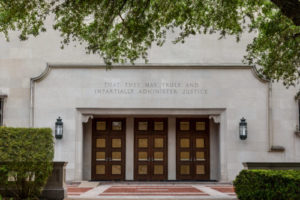Texas Law Review, Adrift
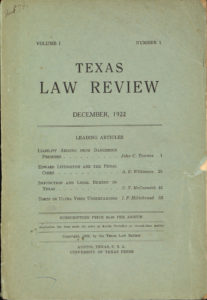
As a law student at the University of Texas many years ago, I was a proud member of the Texas Law Review, the author (actually, co-author) of a student note, and an articles editor for volume 58. I later became a life member of the Texas Law Review Association (an organization for former TLR members) and, despite living in southern California, frequently attended the annual TLR Banquet in Austin. The Banquet serves as a reunion for former TLR members, a recognition of the outgoing and incoming editorial boards, and the occasion for conferring the Leon Green Award on a member of the TLR Association who has made an outstanding contribution to the legal profession. The award is intended to honor former TLR members who have distinguished themselves in the law–a laudable goal.
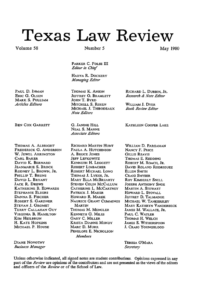
The award is named after the famed torts scholar who taught for decades at UT, interrupted by a three-year stint on the Yale law faculty and a long tenure as Dean at Northwestern University School of Law. Green is credited with the founding of the Texas Law Review in 1922. Although he retired from the faculty in 1977, just before I enrolled, he was still a presence at Townes Hall while I was a student.
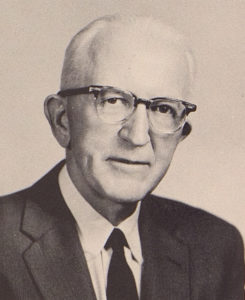
At some point, distracted by my career and the demands of raising a family, I stopped attending the annual Banquet. In connection with some research for another post, I recently stumbled upon the TLR Association webpage and scanned a compilation of Leon Green Award recipients since the honor was established in 1970. My unscientific impression from the list is that the Leon Green Award serves as a barometer for the evolving politics within the legal academy, and more particularly with UT law school. Law schools have become politicized, and increasingly promote an agenda beyond simply training students to be lawyers. Law schools, even at UT, have become social justice academies. The pay-to-play culture of Texas also fosters a tendency toward cronyism for donors.
My sense is that, unlike hotbeds of intellectual activism such as Berkeley, Harvard, and Yale, UT law school was fairly apolitical during the 1970s and ‘80s, focusing on “nuts and bolts” courses such as Oil and Gas, Tax, etc. UT law school professors traditionally teach long past the customary retirement age, so any “innovations” in faculty hiring at UT would tend to trail trends elsewhere.
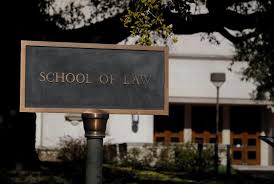
During the 1970s, with a single exception the Leon Green Award was given to “honorific” figures of unquestioned distinction, such as leading state or federal judges (Texas Supreme Court Chief Justice Joe Greenhill, Fifth Circuit Judge Thomas Gibbs Gee, Ninth Circuit Judge Joseph Sneed) or present or former UT faculty members (A.W. Walker, John Sutton, Parker Fielder, Page Keeton, Albert P. Jones, Marian Boner). The only recipient who was not a prominent judge or faculty member was in 1971: Steve Susman, a well-known and accomplished Houston lawyer who was a former editor-in-chief of the law review, a Supreme Court clerk, and a generous supporter of the law school (the Stephen D. Susman Academic Center is named in recognition of his generosity).
The 1980s, a tumultuous time at some other schools (prompting the formation of the Federalist Society), was largely uneventful at the TLR Association. The Leon Green Award was given to prominent judges (Ninth Circuit Judge Walter Ely, for whom I clerked; Fifth Circuit Judges William Garwood and Homer Thornberry; Chief Justice John Hill and Justice Jack Pope of the Texas Supreme Court; and federal district Judge Robert Keeton, who was a former Harvard law professor and Page Keeton’s brother), respected faculty members (W.W. Gibson, Ernest E. Smith), institutionally to the law school foundation trustees, and someone named Wilbur J. Matthews, about whom Google yields no useful information.
Things began to shift in the 1990s, as the criteria for recipients was relaxed to no longer require membership in the TLR Association (or even graduating from UT law school) if the recipient had strong ties to the school. This change enabled the Leon Green Award to go to Fifth Circuit Judge Jerre Williams (who formerly taught at UT), Dean Mark Yudof, and the legendary Professor Charles Alan Wright, all of whom attended law school elsewhere. Other award recipients were prominent practitioners active in the law school community (Harry Reasoner, Scott Atlas), prominent judges (Fifth Circuit Judge Edith Jones), and some lesser-known federal district judges (Wayne Justice, George Kazen, and Barefoot Sanders, all liberals) who were UT alumni. The biggest deviation from tradition was awarding a judge who had neither attended UT law school nor formerly taught there (Fifth Circuit Judge Thomas Reavley, appointed by President Jimmy Carter), although he received his undergraduate degree from UT and was a lifelong Texan. A pattern was emerging. The Leon Green Award was not primarily for former TLR members.
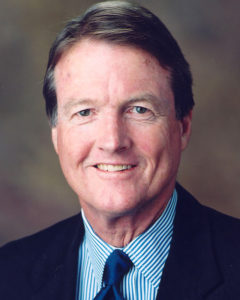
While Bill Powers was Dean of the law school (2000-2005), criteria for the award continued to shift. Leon Green’s namesake award became a prize to be given to long-time faculty and former Deans who were not UT alumni (Michael Sharlot, Bill Powers), prominent judges who were not UT alumni (Fifth Circuit Judge Carolyn Dineen King, who is married to Reavley and was also appointed by Carter), federal district Judge Royal Ferguson, and lawyers who were either well-connected (Larry Temple) or had demonstrated significant achievement in private practice (David Beck, James B. Sales, and Susman’s partners Lee Godfrey and Parker Folse), or both. For the first time, in 2009 the Leon Green Award was given to an otherwise undistinguished legislator, state Sen. Rodney Ellis, a Democrat from Houston. While Ellis graduated from UT law school, he was not a member of the Texas Law Review. Honoring Ellis smacks of cronyism, or identity politics.
With Bill Powers ensconced as President of UT (2006-2015), during the decade beginning 2010 the Leon Green Award was given to a leading member of the practicing bar (Robin C. Gibbs), the Chief Justice of the Texas Supreme Court (Wallace Jefferson), posthumously to Texas’ first Solicitor General, the beloved Greg Coleman, and then to a series of recipients who are accomplished (but not in the same league as the prior decades) but also “political” and/or politically correct: Former Third Court of Appeals Justice Bea Ann Smith (appointed by Democrat Gov. Ann Richards); Seventh Circuit Chief Judge Diane Wood, a judicial activist appointed by President Bill Clinton; plaintiff lawyer and UT donor William Mithoff; former Houston mayor and Democratic gubernatorial candidate Bill White; and former Travis County district court judge Scott McCown, who later led the left-wing activist group Center for Public Policy Priorities, and now directs the law school’s Children’s Rights Clinic. Is it a coincidence that the keynote speaker for the Banquet at which McCown was feted was Democrat politician Julian Castro, former mayor of San Antonio, former HUD Secretary under President Obama, and darling of Texas liberals?
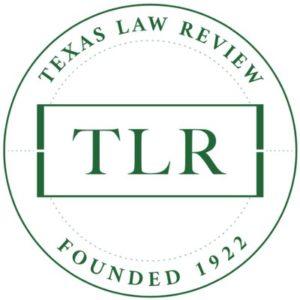
Pardon my saying so, but some of these recipients don’t belong on the same list as luminaries of the Texas bench and bar, for the same reason that .200 hitters don’t get into the Baseball Hall of Fame. Failing to keep the standards high demeans the exceptional performers who deserve recognition. An award for legal accomplishments by former law review members should not go to politicians. And even accomplished alumni of UT law school should not be able to “buy” the award with large donations to the school (or the law school foundation), either personally or through their law firms. (Gibbs currently chairs the foundation; other trustees include Atlas, Mithoff, and Reasoner; “senior trustees” include Ellis, Godfrey, Jefferson, and Susman; and Temple is a “trustee emeriti.”) One can almost predict future Leon Green Award recipients by reviewing the foundation’s board of trustees. The foundation, which manages over $180 million in endowed funds for the law school, is a shadowy and powerful organization that was at the center of a scandal a few years ago involving secret, forgivable “loans” to selected UT law school faculty and administrators, leading to the ouster of Larry Sager (who received a $500,000 “loan”) as Dean. Bill Powers, who was forced to resign as President of UT due to his ignominious role in a preferential admissions scandal, has returned to UT law school as a senior faculty member, earning over $350,000 a year.
This is not an auspicious trend. UT law school has thousands of graduates, all over the country, many of whom are practicing law at a high level, serving with distinction on state and federal courts, teaching at various universities, writing best-selling books, holding important government posts, and providing outstanding service to society in a variety of ways. I can think of dozens of candidates whose contributions and achievements easily exceed some of the recent recipients.
Has the Leon Green Award become off-limits to them, reserved for a clique of liberal cronies, well-connected donors, politically-correct totems, and law school insiders? If so, that would be just another cherished tradition that UT has shed to become a crony network or social justice academy. The 2018 Banquet will be held on April 7. I will be interested to see who gets the award this year.
